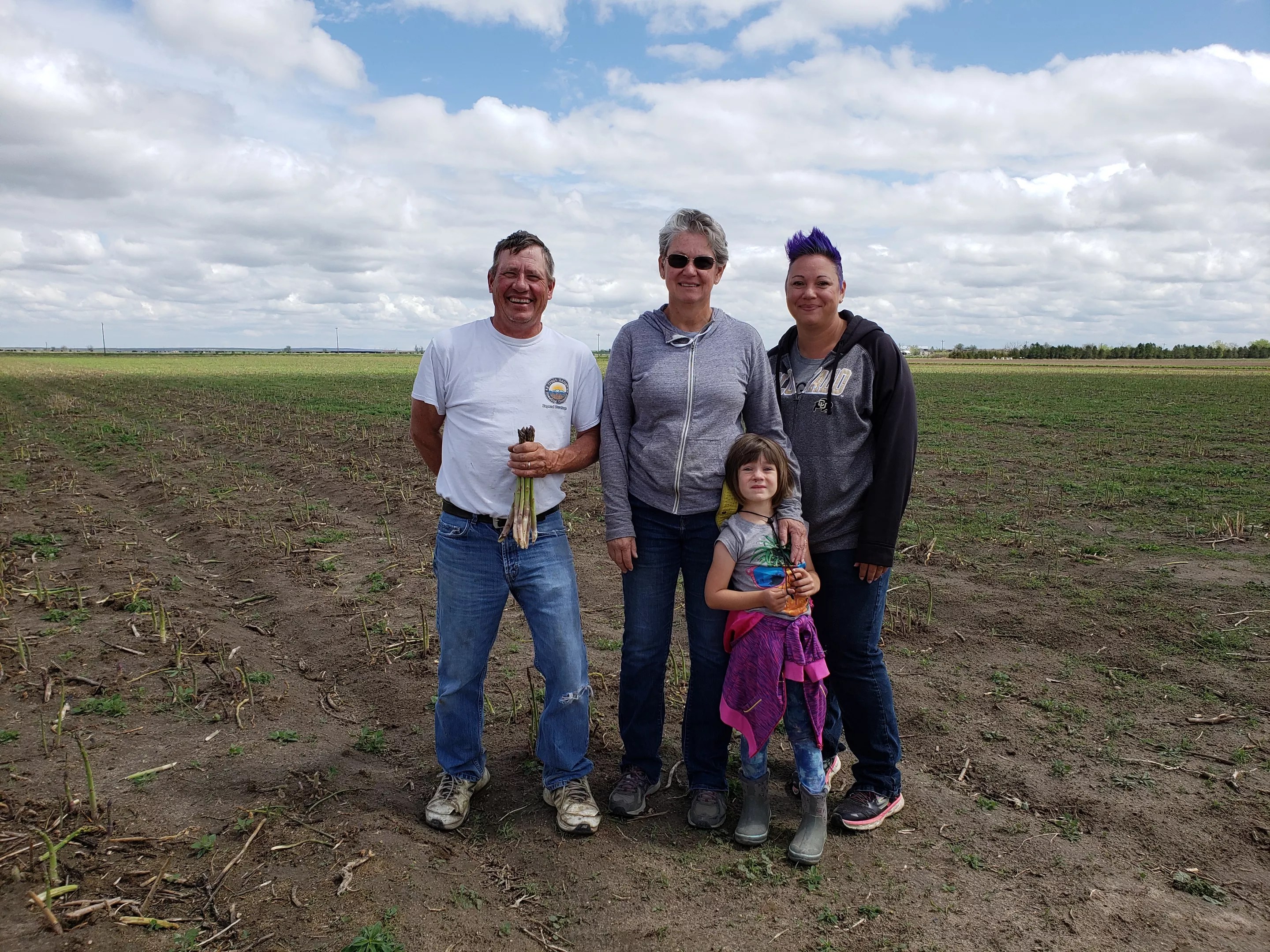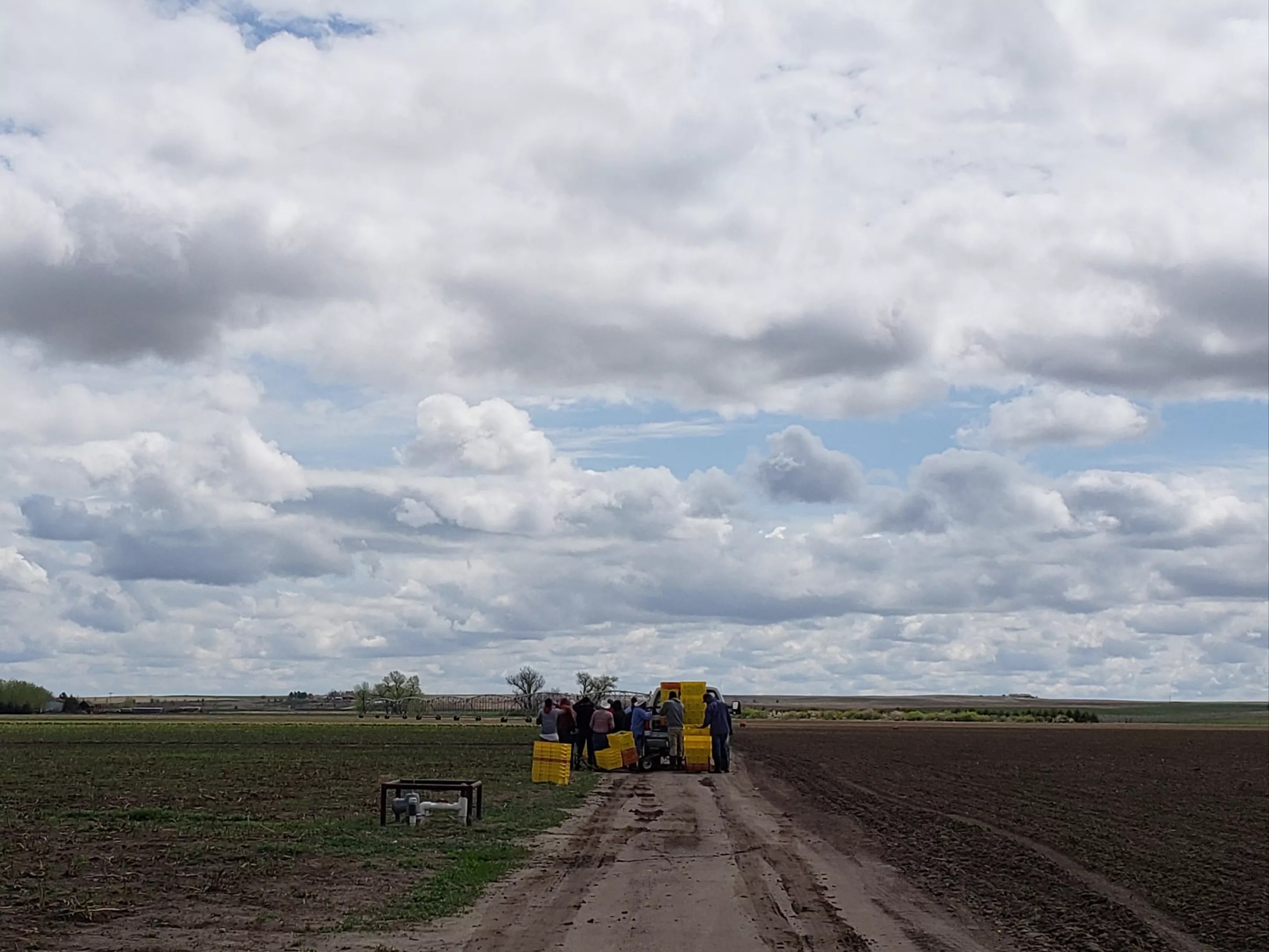
Linnea Covington

Audio By Carbonatix
If you pick up a locally grown bunch of asparagus, there’s a good chance it came from Kiowa Valley Organics, a large farm on Colorado’s eastern plain. The only other major grower of the crop is in Pueblo (and it’s not organic), and save for some small plots here and there, asparagus isn’t a popular vegetable among Colorado farmers.
The reason more people don’t grow it? It’s hard to get the plant started, and once you do, it takes a lot of work to keep it going and to harvest it.

You need a special tool to dig in the ground and cut single stalks of asparagus. It’s a labor-intensive job, but one that yields tasty results.
Linnea Covington
“Asparagus is so labor-intensive,” says David Rippe, who co-owns Kiowa Valley Organics with his wife, Sara Bevan. “And before you even get a product, you throw money out hand over fist for about three years,” Rippe says with a grin as he continues to describe how he and Bevan started their asparagus plots in 2007. First, he explains, you have to seed the stuff in a greenhouse. The next year you can take the asparagus crowns (the spidery root systems) and plant them one at a time in the field. The third year is spent keeping the plants watered, weeded and happy. Finally, in year four, you can start harvesting the shoots, something this farm does by hand.

Kiowa Valley Organics is a family farm owned by David Rippe and his wife, Sara Bevan (center). Bevan’s daughter, Krista Peace, also helps, along with her five-year-old, Allison.
Linnea Covington
But before the perennial vegetable sprouts in springtime to be picked in April and May, the family has to burn last year’s fronds out of the field sometime around the end of March. They grow so tall, says Bevan, that deer sleep among them during the colder months. Once the fronds have been burned away, the farmers wait for the asparagus to start growing again, fresh and green, with dark-purplish tips.

Bundling asparagus in one-pound bunches at Kiowa Valley Organics.
Linnea Covington
The first bunch can pop up any time in April, says Bevan’s daughter, Krista Peace, who also works the farm. And when that happens, the harvesting crew starts filling twenty-pound bins with the thick green stalks. So far this year, the farm has a top one-day’s harvest of 330 boxes, or about 6,600 pounds. After it’s picked, the asparagus is moved into a processing barn, where each one-pound bundle is hand-sorted, banded and placed in cold water to help tighten it up for transport. The “ugly” stalks are put aside for a local food bank, and big shipments are held in the farm’s huge walk-in refrigerator. The process repeats every day until mid-June, when the crop has finally been spent.

A delivery of freshly picked asparagus ready to be sorted and processed at the farm’s small facility.
Linnea Covington

Kiowa Valley Organics’ asparagus ready to be boxed and sent to buyers.
Linnea Covington
Kiowa Valley Organics grows far more than just asparagus on its 160 acres. Rippe, who grew up on a dairy farm in Roggen near his current property, decided to go the vegetable and beef route when he started his own business. Then, ahead of the organic boom, Rippe had his land certified organic in 1990. Now he grows zucchini, yellow squash, eggplants, sweet and hot peppers, okra, winter squash, decorative squash, beets, cucumbers and more. Rippe and Bevan also deal in organic grass-fed cattle, which live on a nearby pasture the couple rents from Rippe’s father.

The greenhouse at Kiowa Valley Organics in Roggen, Colorado.
Linnea Covington
With all of the other produce they raise and harvest, you might wonder why the couple decided to get into the expensive and finicky world of asparagus in the first place. Rippe explains that it was because Bevan had a background in asparagus farming. Before partnering with Rippe in 2002, she worked with a major asparagus producer in Brighton name Steve Brancucci, who ran Golden West Farms. When he retired, the couple bought his farm’s name and continued to sell organic produce through it. That’s why if you order wholesale, you’ll get products from Golden West Farms rather than Kiowa Valley Organics.
When Brancucci retired, he put a big dent in the organic-asparagus business, something Rippe and Bevan recognized. “We started it because there was no competition,” says Rippe.

A pasta dish from Potager starring Kiowa Valley Organics asparagus.
Linnea Covington
In Denver you can find Kiowa Valley Organics asparagus gracing the menu at Potager, Beast + Bottle and Fruition, among others. It’s also at the Union Station and Boulder County Farmers’ Markets. Unlike the usual skinny stems found at the grocery story, Kiowa Valley Organics asparagus stems are thick, with a circumference about the size of a nickle. The stalks have a tight head and a nice squeak when you rub the stems together. That’s what you want to look for when shopping for the vegetable, says Rippe. That, and no brown, dried ends.

Kiowa Valley Organics is the main grower of organic Colorado asparagus, which you can find at the Union Station Farmers’ Market.
Linnea Covington
Each asparagus plot is good for around twenty to thirty years – and when the time is up on those crowns, says Bevan, the farmers will be well and done too. “We are in our sixties, and unless Krista wants to get a partner and take care of it, it ends with us.” But for now, Colorado asparagus is alive and tasty, something you can find in local grocery stores and at the farmers’ market.

David Rippe, owner of Kiowa Valley Organics.
Linnea Covington

Workers harvesting asparagus by hand at Kiowa Valley Organics.
Linnea Covington

Asparagus can grow six inches in a day. Once the stalk is near ten inches, it gets harvested by hand.
Linnea Covington